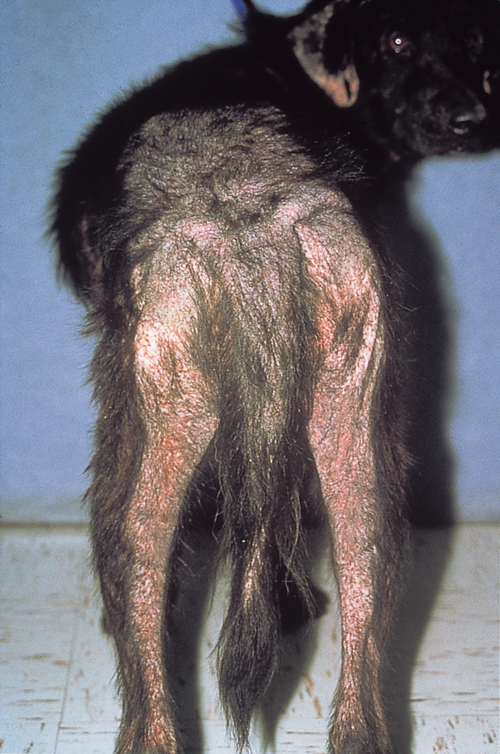Difference between revisions of "Small Animal Dermatology Q&A 13"
Jump to navigation
Jump to search
Ggaitskell (talk | contribs) (Created page with "{{Template:Manson Moriello}} centre|500px<br> <br /> '''A 3-year-old dog is shown.''' <br /> <FlashCard questions="3"> |q1=This ...") |
|||
| (One intermediate revision by one other user not shown) | |||
| Line 12: | Line 12: | ||
|a1= | |a1= | ||
This is a classic case of FAD. | This is a classic case of FAD. | ||
| − | |l1= | + | |l1=Flea Allergic Dermatitis |
|q2=How is this disease treated? | |q2=How is this disease treated? | ||
|a2= | |a2= | ||
| Line 19: | Line 19: | ||
*Glucocorticoids should not be used in this patient to alleviate the pruritus until the microbial infections resolve, and the owner has initiated flea control. | *Glucocorticoids should not be used in this patient to alleviate the pruritus until the microbial infections resolve, and the owner has initiated flea control. | ||
*Immunotherapy for flea bite hypersensitivity has not been successful. | *Immunotherapy for flea bite hypersensitivity has not been successful. | ||
| − | |l2= | + | |l2=Flea Allergic Dermatitis#Treatment |
|q3=What immunological mechanisms are believe to be involved in the development of this disease? | |q3=What immunological mechanisms are believe to be involved in the development of this disease? | ||
|a3= | |a3= | ||
The pruritus of FAD is believed to be caused by a combination of type 1, type 4, late phase reactions, and basophil hypersensitivity reactions. | The pruritus of FAD is believed to be caused by a combination of type 1, type 4, late phase reactions, and basophil hypersensitivity reactions. | ||
| − | |l3= | + | |l3=Flea Allergic Dermatitis |
</FlashCard> | </FlashCard> | ||
Latest revision as of 12:19, 1 September 2011
| This question was provided by Manson Publishing as part of the OVAL Project. See more small animal dermatological questions |
A 3-year-old dog is shown.
| Question | Answer | Article | |
| This is a classic presentation of what allergic skin disease? | This is a classic case of FAD. |
Link to Article | |
| How is this disease treated? | FAD is treated with flea control. This patient has clinical signs of a secondary bacterial pyoderma (note the erythema on the hind legs).
|
Link to Article | |
| What immunological mechanisms are believe to be involved in the development of this disease? | The pruritus of FAD is believed to be caused by a combination of type 1, type 4, late phase reactions, and basophil hypersensitivity reactions. |
Link to Article | |
